
Two weekends ago, I had just finished teaching a Reflexive Performance Reset seminar at the Spot Athletics, which is attached to my office, Hybrid Performance Group. Whenever I finish teaching a seminar, there is an odd mix of emotions and energy. I love to instruct and teach others, so I always leave a weekend seminar with a high amount of energy and excitement that I’m able to do something I truly love and feel is making a difference. At the same time, 16 hours of instructing is still 16 hours of instructing, and my mind usually needs a good cooldown.
RECENT: Three Questions You Should Ask Your Chiropractor
After the seminar finished, I walked over to my clinic to grab my things, close up, and get ready to leave to go train. I also took a moment to jump on my phone and catch up on any missed calls, emails, messages, etc. As I foggily scanned through a group of messages (like literally 12) from my fiancé, I registered something about four daughters and a wife, then another text containing “so sad. His poor wife and other kids.” Again, at this point, my brain was mush, so I scrolled back up to the start of the group of messages to read through a little slower.
“Kobe Bryant died in a helicopter crash today. With his daughter. Crazy.”
Now, the point of this article is not for me to tell my personal story about how tragic the accident was, how Kobe affected me growing up, or how big of a fan I was, etc. (although for the record, he’s the only reason I watched basketball after Michael Jordan retired). Instead, I would like to focus on the takeaways from Kobe’s life that can teach all of us how to pursue our own passions better.
“The most important thing is to try and inspire people so that they can be great at whatever they want to do.”
1. Win the Battle
“When you make a choice and say, 'Come hell or high water, I am going to be this,' then you should not be surprised when you are that. It should not be something that is intoxicating or out of character because you have seen this moment for so long that ... when that moment comes, of course it is here because it has been here the whole time, because it has been [in your mind] the whole time."
The biggest battles in life are fought in your own head. The biggest myth about life in the 21st century in general, but especially for life in America, is that the barriers between yourself and the things you want to accomplish in the world are external in nature. Bullshit. The biggest barrier to you getting what you want out of your life is in between your ears.
From the affirmation side of this battle, most people never truly believe in their abilities to accomplish what they want in life. Everyone has aspirations. The narrative you put into your head and the way you approach these aspirations will determine whether you achieve them. If you are a ship navigating the vast ocean of life, your mind is the captain standing at the helm with his hand on the wheel – and whatever direction the captain decides to go is where that ship is going. If you tell yourself that something is too hard or too unrealistic, or if you simply “hope” that you’ll accomplish something, you are signaling to the captain that you don’t really want to go in the direction of your aspirations. On the flip side, if you know your final destination and are signaling a message to the captain over and over again to get to that destination, when rough seas come along and navigation becomes difficult, even if the captain has to slightly change course, you’ll always keep moving toward your destination.
In reality, the expectations and stories you play out in your head are what will determine your future. Those who tell themselves they can and those who tell themselves they can’t are often both right.
Now you may say that using an athlete is an awful way to make this point, but you would be dead wrong. The reality is that genetics and talent had very little to do with Kobe’s success. Kobe was going to be successful no matter what he did in life because of his mentality. Take away Kobe’s genetic advantages for sports and put him in a board room – I guarantee he builds a Fortune 500 company. Infuse the Mamba Mentality into a doctor and you’ll cure a disease. The time and effort that Kobe put into his career and into mastering the sport of basketball are what made him great. Those attributes can be transferred to success in anything in your life. Want to learn a new language? Go back to school? Start a new job? Learn to play an instrument? The only thing stopping you from accomplishing those goals is the bullsh*t story you keep telling yourself as to why you can’t.
2. Embrace Failure – Stop Fearing It
“When we are saying this cannot be accomplished, this cannot be done, then we are short-changing ourselves. My brain, it cannot process failure. It will not process failure. Because if I have to sit there and face myself and tell myself, 'You are a failure,' I think that is almost worse than dying."
Kobe was well known for his lack of fear to fail. In fact, he was criticized for this characteristic more than he was ever praised for it. In games where he shot abysmally but kept shooting anyways, he was called stupid, a ball hog, etc. In reality, though, this was simply a display of Kobe’s inability to let failure stop or dissuade him – or even be a possibility.
The only thing that defines failure is yourself and your response to it. Too many people play it safe throughout life. We are told we can be anything we want to be as a kid, then immediately afterward, we are taught to avoid risk and to play it safe because of the possibility of failure. We are dissuaded from seeking out challenges because they contain periods of discomfort and hardships. What if you spend all that time and effort and it doesn’t pan out? What will you do? The dirty little secret is that everyone fails. EVERYONE. It’s as frequent an occurrence in life as breathing is. How you respond to failure is what determines your outcome.
“If you’re afraid to fail, you’re probably going to fail.”
Most people look at failure as something to be ashamed of, so they make up excuses, blame external factors, or even flat-out deny their failures and wrongdoings. Not recognizing failure as an option is different from acknowledging when you’re wrong or that something didn’t go as planned. The ability to recognize and learn from failure is an extremely important skill. Every success is built on a foundation of multiple failures.
“The moment you give up is the moment you let someone else win.”
3. Challenges Are Opportunities for Successful People
"Everything negative — pressure, challenges — is all an opportunity for me to rise."
There are two types of people. Those who look at challenges as reasons that they cannot do something, and those who see challenges as the opportunities they need to get another step closer to their goals. Kobe talks about how he looked for negativity, pressure, and naysayers not so that he could bitch about them on his Instagram or acknowledge them publicly, but as fuel to push him further and further. Even after his Achilles injury, the fact that most players do not successfully return fueled his desire to return and play at a high level – just to prove that he was not most players.
Just like failures, there is never a shortage of challenges or hardships in life. These challenges aren’t necessarily a Disneyland vacation, but without them, you will never know what you are truly capable of. In fact, once you understand this concept and embrace it, you’ll learn to enjoy struggle and seek it out. Challenges are one of the best key indicators that you are doing something right and are on the right path.
Think back to the last time you were stressed out by a situation. Like really stressed out. Think about all of the things that were involved during that time. Perhaps there were sleepless nights, long discussions, or hours of effort and work put in. Now think of how that story ended. What happened? Was it as bad as you thought? Did you learn something? Are you better off from it? The answers you give here will tell you what kind of person you are.
4. Age Does Not Determine Fulfillment
"We can always kind of be average and do what’s normal. I’m not in this to do what’s normal."
Kobe was 41 years old when he died. To me, the reason his death was such a tragedy is because of the added loss of his daughter, as well as multiple other parents and children. To say that Kobe, himself, was done living life or that he didn’t have anything ahead of him could not be further from the truth. However, objectively looking at the way Kobe lived his life and the things he accomplished in those 41 years, only a handful of people in the world could say they have done more – regardless of their ages. So, the biggest lesson we can learn from Kobe and his life is that nothing is for sure. Not another season, not your health, and not whether or not tomorrow will come. But if you live out every day chasing the things you want, your life will be full of purpose and without regret.
"I can't relate to lazy people. We don't speak the same language. I don't understand you. I don't want to understand you."
The biggest tragedy in life to me is not when someone dies early but the thought of growing old and having to look back at a life without fulfillment, without purpose, and without realizing your true potential. When asked about retirement in his last season, Kobe said that he was not sad or regretful but excited. He was excited to put that Laker’s jersey on for the last time because he had fully engulfed himself and his spirit into the sport. And when it was time to hang it all up, he knew that he had put everything into his career and had nothing left to give.
Take a second to think about that because that is the definition of fulfillment. Better to give your all and leave the game, a career, or even life knowing that you never held back or failed to take a chance because of fear or laziness. Kobe wanted to be the best and to inspire others to become their best. He certainly will be known as one of the best players of all time, and if we could reflect on and learn from his work ethics, the Mamba Mentality, we could all achieve our own versions of greatness.
Header image credit: hollandog © 123rf.com










